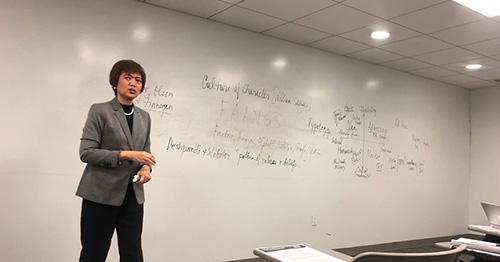The Achievement Index
Welcome to the School of Management's Achievement Index blog. Email your ideas and questions to us at pchandar@nyit.edu.
Dr. Aliza D. Racelis, Visiting Fulbright Scholar, Explains Organizational Culture

This semester, NYIT’s School of Management is hosting a Fulbright Scholar, Dr. Aliza D. Racelis. Dr. Racelis is from the Philippines, and while she is here, she will deliver Professional Enrichment seminars, present her research to faculty, and participate in guest lectures in various classes. Dr. Racelis received her MBA from the National University of Singapore and her PhD in Business Administration from the University of the Philippines.
Dr. Racelis visited Dr. Colleen P. Kirk’s Strategic Branding and Marketing class to discuss her research on organizational culture. In her discussion, she explained that organizational culture is a pattern of shared values and beliefs determined by organizational members that become the norms of behavior inside the organization. Researchers have identified ways to understand the organizational culture in companies. For example, a company can be focused more internally, which involves a focus on the company or product, or externally, which involves more focus on the customers. Additionally, the culture of the organization can either be organic (flexible, adaptive) or rigid (control-oriented, hierarchical). Based on this, Dr. Racelis explained that the culture of organizations can be broken down into four distinct categories: clan, adhocracy culture, hierarchy culture, and market culture. Clan refers to a company that is more family oriented, and they are internal and flexible. Adhocracy culture has more of a corporate culture where the company responds to the needs of the customer. Hierarchy culture ha an internal and rigid corporate culture. Finally, market culture is market-oriented, but at the same time, mindful of processes.
Ultimately, Dr. Racelis explained that organizational culture has an impact on the performance of a company, specifically financially. However, she mentioned that it does not have an impact on performance 100% of the time. Dr. Racelis also discussed the term, culture of character. According to William I. Sauser Jr. in the article, “Empowering Leaders to Craft Organizational Cultures of Character: Conceptual Framework and Example,” Sauser explains the culture of character “is the organizational culture whose leaders and members, ... are truly committed to ethical conduct [and] make ethical behavior a fundamental component of their every action.” (16).

By Konstance Teleisha

More Posts
All PostsOct 30, 2024
The Beginner's Mindset in Business with Bob Miglani
Oct 07, 2024